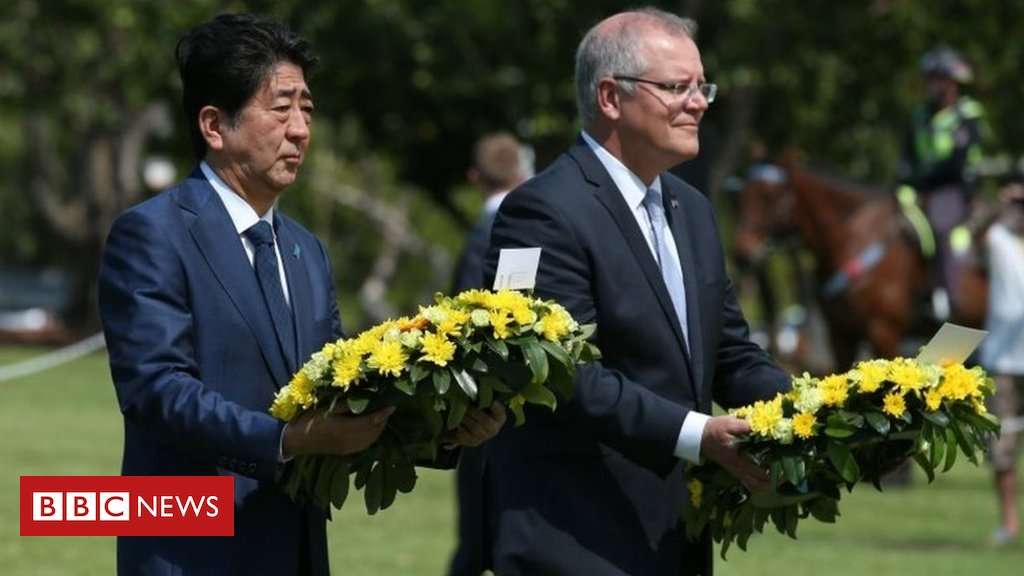Image copyright AFP/Getty Images Image caption Japanese PM Shinzo Abe and Australian counterpart Scott Morrison in Darwin on Friday
In a historic moment, Shinzo Abe has become the first Japanese leader to visit Darwin, Australia, since it was bombed by Japan during World War Two.
The first raids in February 1942 left about 250 people dead, hundreds more injured, and destroyed numerous Allied ships as well as much of Darwin itself.
Mr Abe joined Australian PM Scott Morrison in laying wreaths in a solemn ceremony at the city's war memorial.
Mr Morrison has described the visit as a "time of healing" and friendship.
The leaders observed a minute's silence, remembering the worst wartime loss of life on Australian soil.
They also paid respects to 80 Japanese sailors who died when their submarine was sunk off Darwin in January 1942.
Image copyright Getty Images Image caption The bombing killed hundreds of people and prompted others to flee
Speaking on Thursday, Mr Morrison said: "Prime Minister Abe's visit is deeply symbolic and significant and it will build on our two countries' strong and enduring friendship, as well as our economic, security, community and historical ties."
He acknowledged, however, that Australians "directly touched" by the events may find the moment difficult.
Mr Abe and Mr Morrison did not speak publicly at the ceremony on Friday, but were expected to release a joint statement.
The bombing of Darwin began 10 weeks after the attack on Pearl Harbor in Hawaii, and only days after the fall of Singapore.
There were 64 raids on Darwin until November 1943 but most did not cause casualties, according to the Australian War Memorial.
In 2016, Mr Abe joined then US President Barack Obama in visiting the US naval base at Pearl Harbor.
Japan and Australia have built their relationship with security and trade pacts in recent years, despite occasionally straining ties over whaling.
Mr Abe's visit coincides with the official opening of a major LPG (liquid petroleum gas) processing facility in Darwin that is intended to boost Japan's energy security.

ByahhByahh on November 16th, 2018 at 15:29 UTC »
As anyone who has family members that were lost during times of war you may understand how easy it is to feel anger towards anyone in the group that killed them.
One of my relatives died in Vietnam and he was a favorite of one of my other relatives. She held onto a hatred for many, many years and no matter what you told her, that no one she hates was responsible for killing him, it didn't change her feelings. Hopefully there are people in Australia who are able to look past the actions of the Japan that did those things and can learn to love and accept those around them today. We can apologize for the things our predecessors did that we know are wrong and should be able to acknowledge that those making the apology also realize they were wrong and deserve to not be tied to someone else's transgressions.
ZDTreefur on November 16th, 2018 at 15:25 UTC »
Is he going to recognize Nanking?
najing_ftw on November 16th, 2018 at 13:26 UTC »
My ignorant American education is showing. This is the first I’ve heard that Japan bombed Australia.